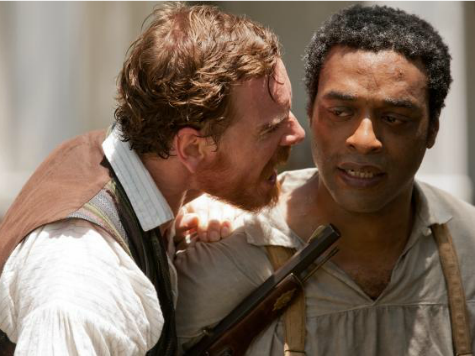
“12 Years a Slave” won 2013’s Best Picture Oscar but not much love at the American box office. Released last week on DVD, this true story that accurately depicts the savage brutality black slaves faced in the American South is nonetheless a “primitive and pornographic bloodbath” that is “bloody to the point of gruesome … without being inspiring.”
Though based on a true story and documented history, the scenes of Solomon Northrup (Chiwetel Ejiofor) being beaten, whipped, hanged, and forever-humiliated is really all about “extreme violence [that] does not teach a lesson; it’s an end in itself, more suited to the S&M crowd[.]“
As Patsey, Lupita Nyong’o plays a young, beautiful slave owned by the depraved and sadistic Edwin Epps (Michael Fassbender). Though the scenes that depict Patsey being brutalized, sadistically raped, and whipped until the flesh literally falls off her back are historically accurate, “what graphic sex is to the use of the body in hardcore porno, graphic violence is to destruction of the body of Christ Patsey in this Passion” director Steve McQueen’s “two-hour-and-six-minute snuff movie — The Jesus Patsey Chainsaw Massacre.”
Overall, I would have to say that “12 Years a Slave,” though historically accurate, is “so relentlessly focused on the savagery of Jesus’ final hours [committed against innocent black slaves] that this film seems to arise less from love than from wrath, and to succeed more in assaulting the spirit than in uplifting it.”
In summation, though historically accurate, “the movie Gibson McQueen has made from his personal obsessions is a sickening death trip, a grimly unilluminating procession of treachery, beatings, blood, and agony.”
Now that I’ve made my point…
Though I haven’t seen every film made last year, or even every film nominated for the Best Picture of 2013, by winning the Best Picture Oscar, director Steve McQueen’s “12 Years a Slave” is yet another year of Oscar-proof of just how far the quality of the motion picture has fallen. While a very good film, other than being politically correct, there is nothing here that would’ve screamed Best Picture during a golden age.
As Solomon Northrup (who is given the slave name Platt), a free black man living a privileged life in the pre-Civil War North before being shanghaied into the brutal life of Southern slavery, Chiwetel Ejiofor is a true stand out. His Oscar-nominated performance helps paper over the script’s arty conceits and simplistic portrayal of the North as some kind of heaven for black Americans in the 1800s.
Contrary to all the, “It’s time for America to have a conversation about slavery” talk that made it sound as though “12 Years a Slave” somehow broke new ground on the issue of American slavery, it does not — not even close. America had this conversation four decades ago during and after the broadcast of “Roots,” a seminal television miniseries that hit on every theme and depicted every brutality and degradation “12 Years” does … and then some.
**SPOILERS COMING***
While nothing close to a revelation about the horrors blacks suffered under the abomination of American slavery, “12 Years” is still worthwhile and compelling. You certainly feel for Solomon and desperately want him to be reunited with his family. And after two-hours of watching our protagonist being brutalized, like “The Passion of the Christ,” the story does close on an uplifting and hopeful note.
In case my sarcasm in the first five paragraphs wasn’t obvious enough, “12 Years a Slave” is NOT torture porn for guilty white liberals. McQueen’s use of explicit violence, which is intentionally excruciating to watch, is necessary to the story for reasons no one has to explain. Just as Mel Gibson demanded Christians witness and experience what our Savior suffered and sacrificed for us, McQueen demands the same about an appalling period in American history.
The only difference between the violence depicted in “Slave” and “The Passion” is that Gibson actually did break new ground in focusing on a crucial aspect of the Christian faith. No one had done that before. Violence-wise “12 Years” just ups the PG-13 violence in “Roots” to R. Another difference, of course, is that America’s elite film critics gushed over the brutally violent historical accuracy in “Slave ” just ten years after many in this same community smeared “The Passion” for doing the same.
Nonetheless, “12 Years a Slave” is a fine drama, well-directed and scripted; beautifully acted, and an emotionally harrowing and ultimately rewarding journey. If, though, in fifty years the film is remembered at all, it is likely to be as a Rorschach Test of a film industry that just doesn’t make Oscar winners like it used to, the politically-driven, herd-mentality that infects the Academy, and just what a bunch of shameless, hypocritical anti-Christian bigots America’s elite film critics were.
Follow John Nolte on Twitter @NolteNC

COMMENTS
Please let us know if you're having issues with commenting.